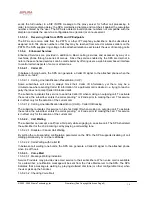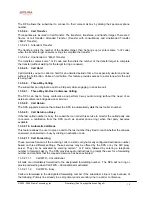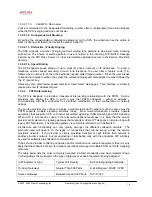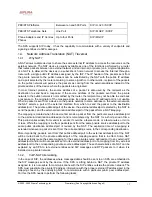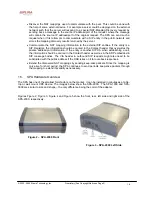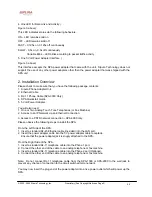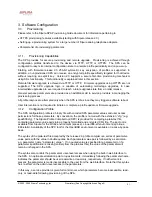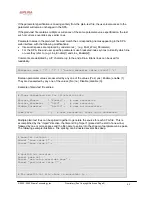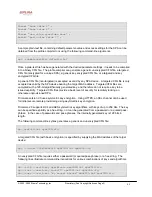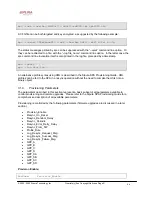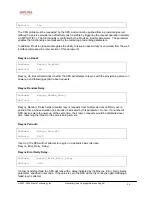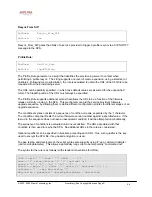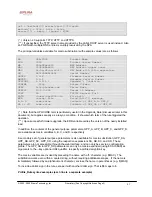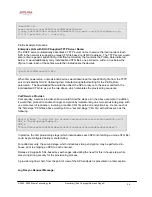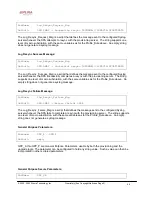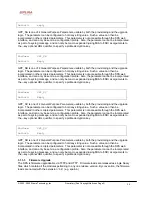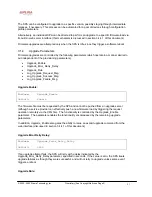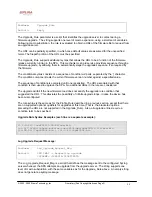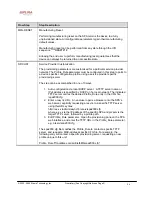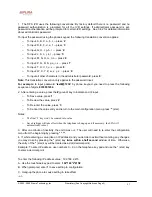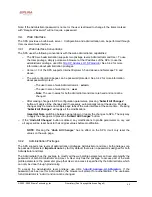
© 2003 - 2005 Sipura Technology, Inc
Proprietary (See Copyright Notice on Page 2)
27
url = [method://][server[:port]]/filepath
method(*) = tftp | http | https
server(**) = empty | ipquad | FQDN
( * ) Version 2.0 supports TFTP, HTTP and HTTPS.
( ** ) If unspecified, the TFTP server name provided by the LAN’s DHCP server is used instead. Also,
an FQDN with multiple DNS entries is multiply resolved by the SPA.
The principal variables available for macro substitution (with example values) are as follows
PN SPA-2000 Product Name
PSN 2000 Product Series Number
MA 000e08aaa010 MAC Address
MAU 000E08AAA010 MAC Address (upper case)
MAC 00:0e:08:aa:a0:10 MAC Addr with Colon separators
SN 88012BAAA10102 Serial Number
SWVER 1.0.2 Firmware Version Number
HWVER 1.0.1 Hardware Version Number
UPGCOND 1.0.2<1.1 Upgrade(*) Condition
SCHEME tftp Access Scheme
SERV http.phoneme.com Server Name
SERVIP 10.2.3.200 Server IP Address
PORT 69 TCP/IP Request Port
PATH /guest/spa2000.cfg File path
ERR corrupt file Error/Info(**) message
A to D some-value Contents of GPP_A to GPP_D
SA to SD some-value Contents of GPP_SA to GPP_SD
( * ) Note that the UPGCOND term is particularly useful in the Upgrade_Rule (discussed later in this
document), but applies equally as a resync condition. It shows which term of the rule triggered the
operation.
( ** ) Upon successful firmware upgrade, the ERR variable carries the version of the newly installed
load.
In addition, the contents of the general purpose parameters, GPP_A, GPP_B, GPP_C, and GPP_D,
are available as macro variables A, B, C, and D, respectively.
A secondary set of general purpose parameters is also available for macro substitution, GPP_SA,
GPP_SB, GPP_SC, GPP_SD, using the respective expressions SA, SB, SC, and SD. These
parameters are not accessible through the web interface, and can only be set via a configuration
profile.
The GPP_SA to GPP_SD parameters can only be macro expanded (using $SA to $SD) as
arguments to the --key optional URL qualifier, to specify a profile decryption key.
The macro variables are invoked by preceding the name with a ‘$’ character (e.g. $MAC). The
substitution works even within a quoted string, without requiring additional escapes. If the name is
immediately followed by an alphanumeric character, enclose the name in parentheses (e.g. $(MAC)).
To include a dollar sign in the rule, escape it with another dollar sign. That is $$ maps to $.
Profile_Rule syntax examples (each line is a separate example):


